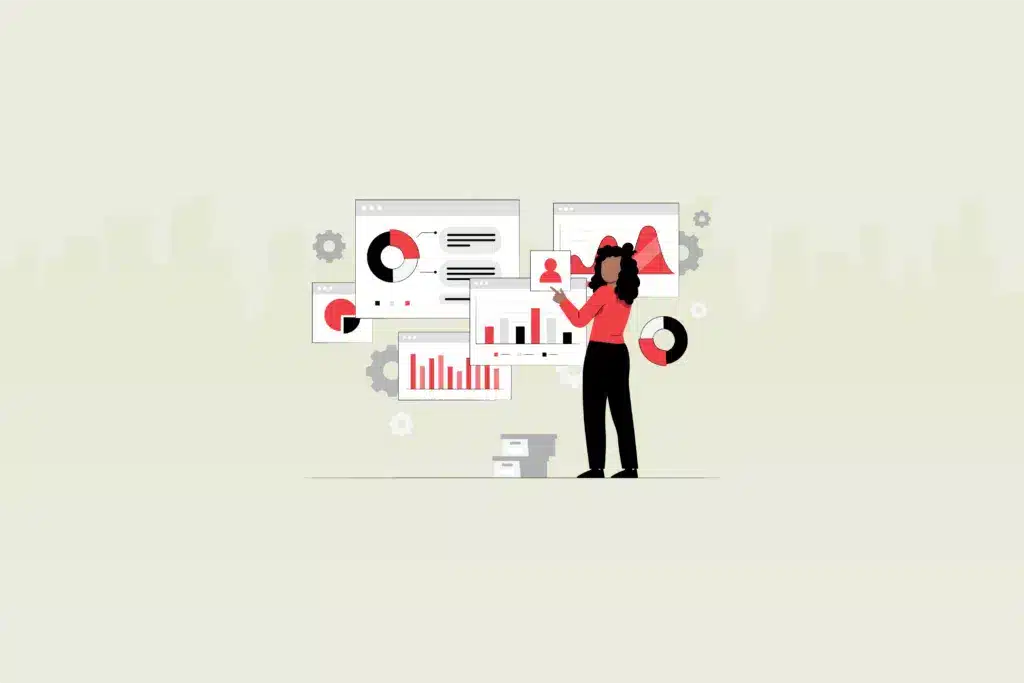In today’s competitive job market, finding the right candidate can be a daunting task for recruiters. Traditional methods of evaluating qualifications and experience often fall short in assessing whether a candidate is the perfect fit for a role and the company culture. This is where pre-employment personality tests come into play. These tests offer a valuable tool for recruiters, helping them make informed decisions that lead to better hires.
In this blog post, we will explore the significance of pre-employment personality tests, their benefits, different types, and best practices for incorporating them into your hiring process.
The significance of pre-employment personality tests
Hiring beyond resumes
Resumes provide a snapshot of a candidate’s work history and qualifications, but they often lack insights into a candidate’s personality, values, and interpersonal skills. Pre-employment personality tests bridge this gap by offering a structured and systematic way to assess a candidate’s suitability for a specific role.
Cultural fit assessment
Ensuring that a candidate aligns with your company’s culture is crucial for long-term success. Personality tests like a cultural fit assessment can reveal whether a candidate shares the values, work ethic, and communication style that your organization prioritizes.
Enhanced predictive validity
Personality tests have been found to have a higher predictive validity compared to traditional interviews and assessments. They provide a standardized framework for evaluating candidates, reducing the bias and subjectivity often associated with hiring decisions.
Benefits of using pre-employment personality tests
Improved hiring accuracy
Pre-employment personality tests represent a powerful tool for recruiters seeking to elevate their hiring accuracy. Beyond assessing qualifications and experience, these tests delve into the intricate realm of personality and cultural fit. By identifying candidates who not only possess the necessary qualifications but also align with the company’s values and culture, recruiters can significantly enhance hiring precision.
This holistic approach minimizes the probability of costly hiring errors, such as choosing a candidate who, despite strong credentials, may disrupt team dynamics or fail to adapt to the organizational culture. Ultimately, the result is improved retention rates, as candidates who seamlessly integrate into the company’s fabric are more likely to thrive in their roles, reducing turnover and fostering long-term employee commitment.
Reduced turnover
Reducing turnover is a constant challenge for organizations, and pre-employment personality tests offer a solution to this perennial problem. By meticulously assessing candidates for not only their job qualifications but also their compatibility with the organization’s values and culture, these tests facilitate the selection of individuals who are better-suited for the job and the company.
As a consequence, these employees tend to stay in their positions for more extended periods, reducing the organization’s turnover rates. The advantages are multifold, as lower turnover rates translate into substantial time and cost savings in terms of recruitment and onboarding. The resulting stability and continuity within the workforce can lead to enhanced productivity, team cohesion, and overall organizational success.
Enhanced Team dynamics
The significance of diverse and harmonious team dynamics cannot be overstated in the modern workplace. Pre-employment personality tests contribute significantly to the creation of such dynamic teams. By systematically evaluating the personality traits of candidates, recruiters can assemble teams that encompass a spectrum of complementary strengths and weaknesses.
This diversity fuels collaboration and innovation within the group, as each member brings a unique perspective and skill set to the table. The synergy of such teams often leads to more effective problem-solving and heightened creativity, ultimately benefiting the organization as a whole. Personality tests, therefore, play a pivotal role in optimizing team composition to achieve superior outcomes and foster a culture of inclusivity and respect.
Faster decision-making
Recruitment is frequently characterized by its time-intensive and laborious nature. The need to process numerous applications and conduct multiple interviews can slow down the hiring process significantly. Pre-employment personality tests offer a streamlined solution. By providing recruiters with data-driven insights into candidates’ personalities and their compatibility with the job and company culture, these tests expedite decision-making.
Recruiters can make more informed and efficient choices, shortlisting candidates who are not only qualified but also likely to thrive in the organizational environment. This expeditious decision-making process is a boon in today’s fast-paced business landscape, enabling companies to secure top talent promptly and maintain a competitive edge.
Legal compliance
Navigating the legal landscape is a paramount concern for recruiters, and pre-employment personality tests can be an asset in this regard. When designed and validated correctly, these tests assist recruiters in making objective and non-discriminatory hiring decisions. By adhering to established guidelines and ensuring that personality tests comply with relevant laws, organizations can reduce the risk of discrimination claims.
This legal compliance underscores the importance of employing well-validated and fair assessment tools, which, when wielded judiciously, enhance hiring precision while mitigating legal pitfalls. Pre-employment personality tests not only optimize recruitment outcomes but also help safeguard organizations from potential legal challenges related to hiring practices.

Types of pre-employment personality tests
There are various types of pre-employment personality tests, each designed to assess specific aspects of a candidate’s personality and suitability for a role. Here are some common types:
1. Myers-Briggs Type Indicator (MBTI)
The MBTI classifies candidates into one of 16 personality types based on their preferences in four key areas: extraversion/introversion, sensing/intuition, thinking/feeling, and judging/perceiving. This test is often used to assess how candidates might fit into a team or work environment.
2. Big five personality test
The Big Five personality test measures five core personality traits: openness, conscientiousness, extraversion, agreeableness, and neuroticism (OCEAN). This test provides a comprehensive view of a candidate’s personality and can help predict their behavior in various work-related situations.
3. DISC assessment
The DISC assessment categorizes candidates into four personality types: Dominance, Influence, Steadiness, and Conscientiousness. It is particularly useful for understanding a candidate’s communication style and work preferences.
4. Emotional Intelligence (EI) assessment
EI assessments evaluate a candidate’s emotional intelligence, including their ability to recognize, understand, and manage their emotions and those of others. This is crucial for roles that require strong interpersonal skills and emotional stability.
5. Values-based assessment
Values-based assessments explore a candidate’s core values and beliefs. They help determine if a candidate’s values align with the company’s mission and culture, ensuring a strong cultural fit.
Best practices for incorporating pre-employment personality tests
While pre-employment personality tests offer numerous benefits, their effectiveness depends on how they are integrated into the hiring process. Here are some best practices for recruiters:
Define clear objectives
Before integrating personality tests into your hiring process, it’s essential to establish clear and well-defined objectives. Consider what specific traits, characteristics, or qualities are essential for success in the role and how these attributes align with your company’s culture. This step is critical for ensuring that the personality test serves a purpose and provides valuable insights during the candidate assessment process. Without clearly defined objectives, it becomes challenging to select the appropriate test and interpret results effectively.
Select the right test
Choosing the right personality test is a pivotal decision in the implementation process. Opt for a test that has been thoroughly validated, possesses high reliability, and is directly relevant to the specific role in question. The selected test should measure personality traits that are directly linked to job performance and align with the qualities you’ve identified in your hiring objectives. Failing to select a suitable test may lead to inaccurate assessments and ultimately hinder your ability to make informed hiring decisions.
Standardize the process
To maintain fairness and consistency throughout your hiring process, it’s essential to standardize the administration of personality tests. Administer the same test to all candidates applying for a particular role. This consistency enables you to make fair and equitable comparisons between candidates, reducing the potential for bias or discrimination in the assessment process.
Combine with other assessments
While personality tests provide valuable insights, they should not be the sole determinant of a candidate’s suitability. It’s crucial to integrate personality tests as one component of a comprehensive assessment process. Complement these tests with other evaluation methods, such as interviews, skills assessments, and reference checks. By combining multiple sources of information, you gain a more holistic view of the candidate’s qualifications and fit for the role.
Provide feedback
After candidates complete personality tests, it’s important to provide them with feedback on their results. Use the test outcomes as a basis for discussing how their personality traits align with the requirements of the role. Transparency is key here, as it helps candidates understand how their test results will be used in the hiring decision-making process. Providing feedback not only enhances the candidate experience but also fosters a sense of fairness and clarity in the assessment process.
Train recruiters
Effective utilization of personality test results requires proper training for recruiters and hiring managers. Ensure that your team is well-versed in interpreting and applying these results correctly. Misinterpretation can lead to incorrect conclusions about a candidate’s suitability for the role. By investing in training, you empower your team to make informed decisions and avoid potential pitfalls associated with misusing personality test data.
Regularly review and update
The effectiveness of personality tests may evolve over time, along with the changing landscape of your organization and the job market. Periodically review your assessment process to assess its alignment with your hiring objectives. If necessary, make adjustments to ensure that personality tests continue to serve their intended purpose and provide valuable insights into candidate suitability. Staying up-to-date and adaptable in your approach will help you maintain a competitive edge in talent acquisition and selection.

Overcoming challenges
While pre-employment personality tests offer many advantages, they are not without challenges. It’s essential to be aware of these challenges and address them proactively:
Potential for bias
Personality tests serve as powerful tools in the hiring process, but they carry the risk of introducing bias if not meticulously designed and administered. It’s crucial to ensure that these tests remain impartial and free from any form of cultural or gender bias. Bias in personality tests can lead to unfair advantages for certain groups while disadvantaging others, undermining the integrity of the hiring process.
To mitigate this risk, it is essential to work with professional test developers who follow best practices for minimizing bias. Regularly review and update your tests to align them with evolving diversity and inclusion standards. Furthermore, establish clear guidelines for interpreting test results, emphasizing the importance of evaluating candidates based on their individual merits rather than stereotypes or preconceived notions.
Privacy concerns
Respecting candidates’ privacy is paramount when implementing personality tests. Before administering these tests, obtain informed consent from candidates, explaining the purpose of the test and how the results will be used. Transparency in this process not only adheres to ethical standards but also fosters trust between the candidate and the hiring organization.
Additionally, it’s essential to store personality test results securely and in strict compliance with data protection laws. Protecting sensitive candidate information is not only an ethical obligation but also a legal requirement. Make sure your data storage and handling procedures are robust, ensuring the confidentiality and integrity of candidate data.
Cost and time
Developing and administering personality tests can indeed be a resource-intensive endeavor in terms of both time and cost. Crafting effective tests that accurately assess the desired personality traits, along with the logistics of test administration, can require a significant investment.
However, it’s essential to view these expenses as an investment rather than a mere cost. Personality tests have the potential to yield substantial long-term benefits. They contribute to better hiring decisions, reduced turnover, improved team dynamics, and enhanced organizational performance. The upfront costs are outweighed by the return on investment in the form of a more skilled and engaged workforce.
Resistance from candidates
Resistance from candidates regarding personality tests is not uncommon. Some may have concerns about how their test results will be used or fear that the results could be used against them in the hiring process. To address these apprehensions, it’s crucial to communicate openly with candidates.
Explain the purpose of the personality tests, emphasizing that they are used to assess job fit and cultural alignment rather than personal judgment. Provide candidates with an opportunity to ask questions and seek clarification about the testing process. Creating a transparent and candidate-centered approach can alleviate many of these concerns and make candidates feel more comfortable and informed about the assessment process. This, in turn, can lead to a more positive candidate experience and a more successful hiring process overall.
Conclusion
In the ever-evolving landscape of recruitment, pre-employment personality tests have emerged as a must-have tool for hiring. They offer recruiters a way to go beyond qualifications and experience to assess a candidate’s personality, values, and cultural fit. By incorporating personality tests into your hiring process and following best practices, you can improve hiring accuracy, reduce turnover, enhance team dynamics, and ultimately build a stronger, more successful organization.
As you consider implementing personality tests in your hiring process, remember to choose tests that align with your hiring objectives, treat candidates with respect and fairness, and continuously evaluate and refine your approach. With the right approach, pre-employment personality tests can be a valuable asset in your quest to find the perfect candidates for your organization.
Ready to harness the full potential of personality tests in your hiring process? Try Testlify, our cutting-edge talent assessment tool, to streamline your recruitment efforts, improve decision-making, and build a winning team. Sign up for a free trial now.








